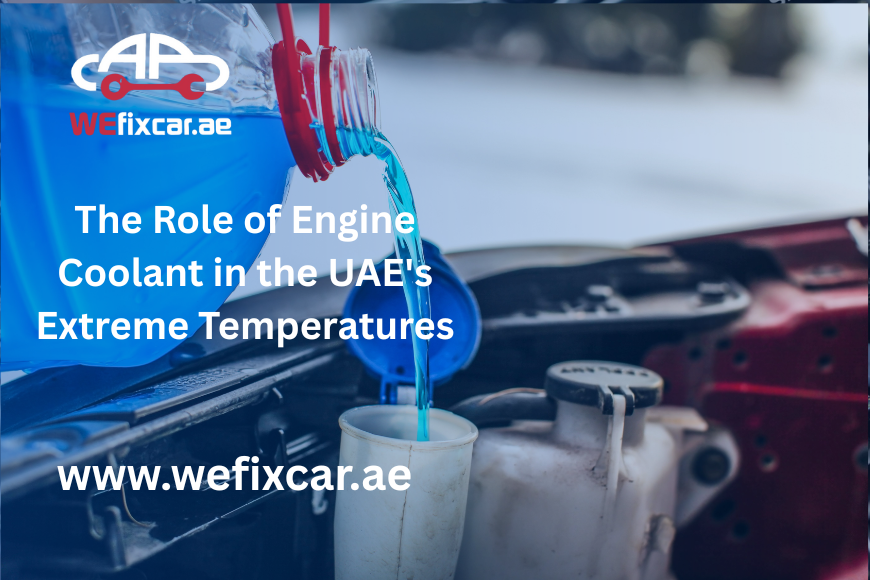In the extreme heat of the UAE, maintaining your vehicle’s cooling system is crucial for preventing engine overheating and ensuring the overall longevity of your car. Engine coolant, also known as radiator fluid or antifreeze, plays a vital role in regulating the temperature of your engine, especially during the long, hot summer months when temperatures can soar. Understanding the importance of engine coolant and how it works in the UAE’s unique climate will help you avoid overheating, ensure smooth engine performance, and prevent costly repairs.
1. Why Engine Coolant Is Essential in Hot Climates
Engine coolant circulates through the engine and radiator, absorbing heat produced by the engine and transferring it to the radiator, where it is cooled. This process helps maintain the engine temperature within optimal operating levels. In hot climates like the UAE, the risk of engine overheating is significantly higher due to constant high temperatures and frequent long-distance driving in traffic-heavy areas like Dubai and Abu Dhabi.
Without adequate coolant levels or quality, your engine could easily overheat, leading to engine failure, blown gaskets, or even permanent damage. Regularly maintaining and checking your engine coolant system is essential to avoid these issues.
2. Types of Engine Coolants in the UAE
When it comes to coolant types, there are generally two main categories:
- Ethylene Glycol Coolant (Green): This type of coolant is more common and provides both freeze protection and corrosion resistance. It’s suitable for vehicles in climates with mild to cold temperatures, but it can work in hot environments as well if changed regularly.
- Propylene Glycol Coolant (Orange or Pink): Known for being more environmentally friendly, propylene glycol coolant also offers excellent cooling properties. It’s less toxic than ethylene glycol and is used in many modern vehicles. It’s a suitable choice for vehicles operating in the UAE’s extreme heat.
Note: Some vehicles may require specific coolant types, so always refer to your car’s manufacturer guidelines for the correct coolant specifications.
3. Symptoms of Low or Old Coolant
It’s important to monitor your car’s coolant system regularly, especially in the UAE where high temperatures can cause the coolant to break down faster. Here are some signs that your engine coolant may need attention:
- Engine Overheating: If your car’s temperature gauge moves into the red zone or you notice a burning smell, it may be due to a lack of coolant.
- Coolant Leaks: Check for puddles of coolant underneath your car or visible leaks around the radiator or hoses. Leaking coolant can cause the engine to run at an unsafe temperature.
- Poor AC Performance: If your vehicle’s air conditioning system isn’t functioning properly, it could be due to an overheated engine and insufficient coolant flow.
- Check Engine Light: Your car’s computer system may detect a problem with the coolant temperature sensor, causing the check engine light to illuminate.
If you notice any of these symptoms, it’s important to top up or replace your coolant as soon as possible to prevent engine damage.
4. Importance of Regular Coolant Maintenance in the UAE
In the extreme heat of the UAE, coolant maintenance becomes even more critical. Here are some essential maintenance tips to keep your car’s cooling system functioning effectively:
- Coolant Flush: A coolant flush is the process of draining the old coolant, cleaning the cooling system, and refilling it with fresh coolant. Over time, coolant can become contaminated with debris, rust, and dirt, reducing its effectiveness. A regular coolant flush every 30,000 to 50,000 kilometers is recommended in hot climates.
- Coolant Level Check: Ensure your coolant level is maintained within the recommended range. If the coolant is low, it can lead to overheating. You can easily check the coolant level by inspecting the reservoir tank, typically located near the radiator.
- Radiator Inspection: In addition to monitoring the coolant, inspect your radiator for any signs of damage or blockage. A clogged radiator can prevent the coolant from flowing properly, leading to engine overheating. Look for any leaks or rust that may signal the need for a radiator flush or replacement.
- Thermostat Check: The thermostat controls the flow of coolant to regulate engine temperature. If the thermostat is malfunctioning, it can lead to overheating or underheating. Regular checks and timely replacements of a faulty thermostat are essential.
5. How to Prevent Overheating in the UAE
Preventing engine overheating in the UAE’s extreme temperatures requires a combination of proper coolant maintenance and regular car service. Here’s how to reduce the risk of overheating:
- Park in Shade: Always try to park your car in shaded areas to avoid direct sunlight, which can increase the internal temperature of the engine and coolant system. If no shade is available, use a sunshade to protect your interior.
- Drive Cautiously: Avoid excessive acceleration or idling for long periods, as this can cause your engine to overheat faster, especially when the vehicle is under load. Long trips during peak summer heat can be hard on your engine, so ensure the cooling system is in top shape before venturing out on long journeys.
- Monitor the Weather: Pay attention to the weather, especially during the summer months when heatwaves are more likely. In extreme heat, it’s advisable to perform regular checks on the coolant system to avoid any issues that could arise.
Call to Action
Maintaining your engine coolant system is vital for the health of your car, especially when driving in the UAE’s extreme temperatures. By regularly checking the coolant level, performing a coolant flush, and addressing any cooling system issues, you can prevent overheating and ensure that your vehicle runs smoothly for years. If you’re unsure about the condition of your car’s coolant system, don’t hesitate to take your vehicle to a trusted auto service center for a thorough inspection and maintenance.
FAQs – Engine Coolant in the UAE
1. How often should I replace the engine coolant in the UAE?
It’s generally recommended to replace the engine coolant every 30,000 to 50,000 kilometers or every two years. However, if you drive frequently in extreme heat or notice signs of engine overheating, more frequent checks are advisable.
2. Can I use any coolant in my car?
It’s important to use the type of coolant specified by your car’s manufacturer. Always refer to the owner’s manual or consult a professional mechanic to ensure you’re using the right type of coolant.
3. What should I do if my car is overheating?
If your car starts to overheat, pull over safely and turn off the engine. Allow it to cool down before opening the hood. Check the coolant level and top it up if necessary. If the problem persists, seek professional help immediately.
4. Can low coolant cause my air conditioning to stop working?
Yes, insufficient coolant can lead to overheating, which can affect your air conditioning system. If your engine is too hot, the AC may not function effectively, as both systems rely on the engine’s temperature regulation.
5. How can I check the coolant level in my car?
The coolant reservoir is typically marked with “Low” and “Full” lines. Simply open the cap (when the engine is cold) and check if the coolant level is within the recommended range. If it’s low, top it up with the appropriate coolant.



